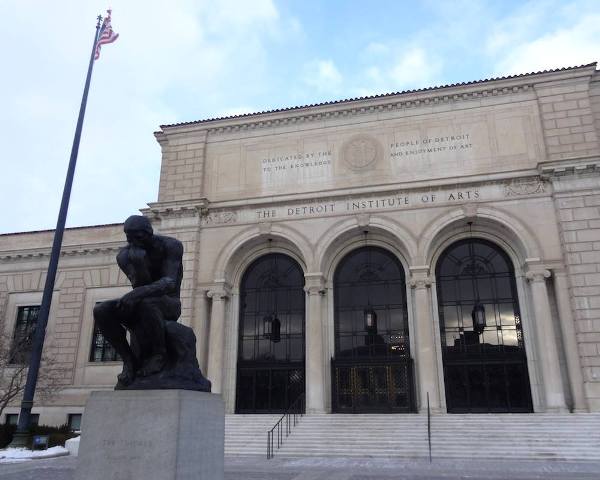Art & Exhibitions
Mellon and Getty Foundations Pitch in to Save Detroit Institute of Arts

Photo: Benjamin Sutton.

Sarah Cascone

Taking the lead from Detroit’s automotive giants, two leading national charitable foundations have also pledged their support to the imperiled Detroit Institute of Arts (DIA), reports the Detroit Free Press. The Andrew W. Mellon Foundation and the J. Paul Getty Trust are offering a combined $13 million to put toward the $100 million the museum must contribute to the “Grand Bargain” devised to free the institution from city ownership while shoring up Detroit pension funds.
With $10 million from the Mellon Foundation, based in New York, and $3 million from the Getty in Los Angeles, the DIA is that much closer to meeting the $100 million target. Earlier this week, Chrysler, Ford, and General Motors announced $26 million in total contributions (see artnet News report). Previously, the museum had received an additional $7.5 million from other donors.
The museum claims to have commitments for up to 70 percent of the $100 million goal, and is expecting to announce donations from a number of other corporations and organizations soon, including DTE Energy, Blue Cross Blue Shield of Michigan, and corporations owned by Dan Gilbert.
Devised by city emergency manager Kevyn Orr as the backbone of a restructuring plan that will get the bankrupt city back on track, the Grand Bargain funnels some $816 million from national and local foundations, the DIA, and the state of Michigan into city pension coffers, which would otherwise face severe cuts. In exchange for this ransom, the museum becomes an independent charitable trust, and its assets (primarily its world class collection) are off the table as bargaining chips as the city resolves its debts.
In an interview with the Detroit Free Press, Mellon Foundation vice president Mariët Westermann underscored the DIA’s cultural importance outside the state of Michigan, describing the museum as “a resource for people internationally, and a lure for people to come to Detroit. That’s why you’ve seen not only national foundations with a stake in Michigan like Ford and Kresge coming to the table but also why foundations like Mellon were interested.”
Normally, groups like the Getty and the Mellon would not get involved in issues of municipal debt, but these are unique circumstances. Conversely, politicians can rest easy knowing that the agreement does more than just support the arts, putting money directly into pensioners’ pockets. (As artnet News reported last week, the state is also on board with the Grand Bargain, agreeing to contribute $195 million to the plan.)
The final hurdle for the museum isn’t just raising the money. Detroit pensioners must vote on July 11, and while many leaders of pension groups have voiced their approval for the plan, there is no guarantee retirees will decide in its favor. The deal includes a 4.5 percent cut, save for police and fire fighters, but would seem preferable to the alternative, which involves 27 percent cuts and puts the DIA collection back on the bargaining table and, possibly, the auction block.
The last step would be gaining the support of U.S. Bankruptcy Judge Steven Rhodes at trial (the case is currently scheduled to be heard in August). Creditors are likely to do all that they can to prevent the arrangement from being enacted. Many still argue that Christie’s $816 million appraisal of the collection severely undervalues the museum’s collection (which, as arnet News reported, is currently being reappraised at the behest of creditors), while others call the plan illegal for not providing equal satisfaction to creditors other than pensioners.
So, while this latest cash infusion from the Mellon and the Getty is a step in the right direction, the DIA is not out of the woods yet.